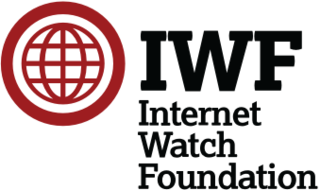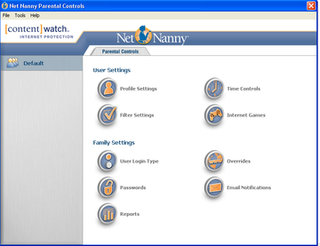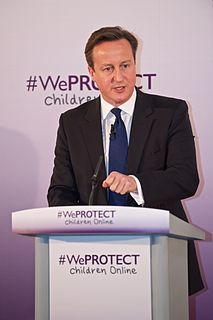Content-control software, commonly referred to as an Internet filter, is software that restricts or controls the content an Internet user is capable to access, especially when utilised to restrict material delivered over the Internet via the Web, e-mail, or other means. Content-control software determines what content will be available or be blocked.
The Australian Communications and Media Authority (ACMA) is an Australian Government statutory authority within the Communications portfolio. ACMA was formed on 1 July 2005 with the merger of the Australian Broadcasting Authority and the Australian Communications Authority.
Internet censorship in Australia is enforced by both the country's criminal law as well as voluntarily enacted by internet service providers. The Australian Communications and Media Authority (ACMA) has the power to enforce content restrictions on Internet content hosted within Australia, and maintain a blocklist of overseas websites which is then provided for use in filtering software. The restrictions focus primarily on child pornography, sexual violence, and other illegal activities, compiled as a result of a consumer complaints process.

Parental controls are features which may be included in digital television services, computer and video games, mobile devices and software that allow parents to restrict the access of content to their children. These controls were created to assist parents in their ability to restrict certain content viewable by their children. This may be content they deem inappropriate for their age, maturity level or feel is aimed more at an adult audience. Parental controls fall into roughly four categories: content filters, which limit access to age inappropriate content; usage controls, which constrain the usage of these devices such as placing time-limits on usage or forbidding certain types of usage; computer usage management tools, which enforces the use of certain software; and monitoring, which can track location and activity when using the devices.
Due to the international nature of the Internet, the legal status of Internet pornography carries with it special issues with regard to the law. There is no one set of laws that apply to the distribution, purchase, or possession of Internet pornography. This means that, for example, even if a pornographer is legally distributing pornography, the person receiving it may not be legally doing so due to local laws.
BeatBullying was an international charity aiming to empower young people to lead anti-bullying campaigns in their schools and local communities, and to build the capacity of local communities to sustain the work. BeatBullying devised bullying prevention strategies for young people by young people, focusing on "peer to peer" education and empowering young people to take action against incidents of bullying and help others combat the problem, both online and off.

The Child Exploitation and Online Protection Command, or CEOP Command, is a command of the UK's National Crime Agency (NCA), and is tasked to work both nationally and internationally to bring online child sex offenders, including those involved in the production, distribution and viewing of child abuse material, to the UK courts. The centre was formed in April 2006 as the Child Exploitation and Online Protection Centre, and was absorbed into the NCA on 7 October 2013 by the Crime and Courts Act 2013.

Beeban Tania Kidron, Baroness Kidron, is a British filmmaker and an advocate for children’s rights in the digital world.
Internet censorship in the United Kingdom is conducted under a variety of laws, judicial processes, administrative regulations and voluntary arrangements. It is achieved by blocking access to sites as well as the use of laws that criminalise publication or possession of certain types of material. These include English defamation law, the Copyright law of the United Kingdom, regulations against incitement to terrorism and child pornography.
Censorship in Denmark has been prohibited since 1849 by the Constitution:
§ 77: Any person shall be at liberty to publish his ideas in print, in writing, and in speech, subject to his being held responsible in a court of law. Censorship and other preventive measures shall never again be introduced.
The Byron Review was a report ordered in September 2007 by the then Prime Minister Gordon Brown and delivered on the 27 March 2008 to the UK Department for Children, Schools and Families. It was authored and overseen by Dr Tanya Byron. The Review focussed on the use of video games and the Internet by children, and discussed the use of classification and the role of parenting in policing these.

The Family Online Safety Institute (FOSI) is an international nonprofit organization. It is registered as a 501(c)(3) tax-deductible nonprofit charity in the United States and a registered charity in the United Kingdom. FOSI was founded in February 2007 by Stephen Balkam, who had created the Internet Content Rating Association (ICRA). FOSI is chaired by Dave Pierce, Vice President of Public Affairs, NCTA.

The Internet Watch Foundation (IWF) is a registered charity based in Cambridgeshire, England. It states that its remit is "to minimise the availability of online sexual abuse content, specifically child sexual abuse images and videos hosted anywhere in the world and non-photographic child sexual abuse images hosted in the UK." Content inciting racial hatred was removed from the IWF's remit after a police website was set up for the purpose in April 2011. The IWF used to also take reports of criminally obscene adult content hosted in the UK. This was removed from the IWF’s remit in 2017. As part of its function, the IWF says that it will "supply partners with an accurate and current URL list to enable blocking of child sexual abuse content". It has "an excellent and responsive national Hotline reporting service" for receiving reports from the public. In addition to receiving referrals from the public, its agents also proactively search the open web and deep web to identify child sexual abuse images and videos. It can then ask service providers to take down the websites containing the images or to block them if they fall outside UK jurisdiction.

Net Nanny is a content-control software suite marketed primarily towards parents as a way to monitor and control their child's computer and phone activity.

Childnet International is a registered UK charity that aims to make the internet a safe place for children and young people.
The precise number of websites blocked in the United Kingdom is unknown. Blocking techniques vary from one Internet service provider (ISP) to another with some sites or specific URLs blocked by some ISPs and not others. Websites and services are blocked using a combination of data feeds from private content-control technology companies, government agencies, NGOs, court orders in conjunction with the service administrators who may or may not have the power to unblock, additionally block, appeal or recategorise blocked content.
The Counter-Terrorism Internet Referral Unit (CTIRU) was set up in 2010 by ACPO to remove unlawful terrorist material content from the Internet, with a specific focus on UK based material. CTIRU works with internet platforms to identify content which breaches their terms of service and requests that they remove the content on a voluntary basis. CTIRU also compile a list of URLs for material hosted outside the UK which are blocked on networks of the public estate.
Internet Matters is a nonprofit organisation, based in London, England. It was set up to help parents keep their children safe online.

WeProtect is a global alliance led by the UK government. Founded by Baroness Joanna Shields and supported by over 84 countries, 24 technology companies and 20 civil society organisations, WePROTECT's mission is to stop the global crime of online child sexual abuse and exploitation.







